



The 40th Chess Olympiad is taking place in the Turkish metropole of Istanbul, from August 27 to September 10th, 2012. A record of 158 national chess federations have brought teams to Istanbul to participate in this prestigious event, which is being staged in the WOW Hotel and Convention Center, just minutes away from the airport.
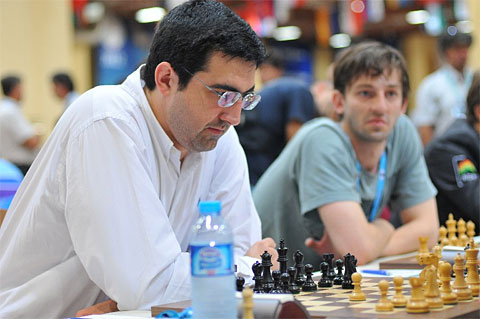
After taking a short break with the previous round, the Russian team (above with Kramnik and Grischuk) has returned to the winning paths in the Open section. The Russians and Azerbaijan signed three draws before the time control, but Alexander Grischuk remained in the seat and kept pressing against Eltaj Safarli, evenually converting the extra pawn into full point, bringing a 2.5-1.5 victory to Russia and redeeming himself for yesterday's setback in the match against Armenia.
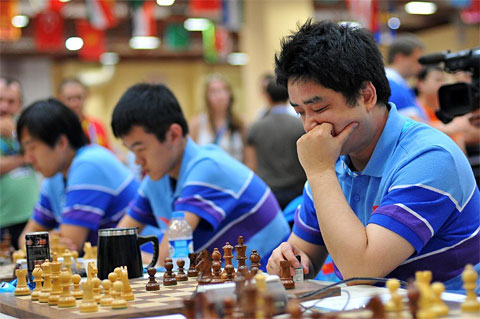
Armenia had another tough match, this time against China, above with Wang Yue, who scored the decisive point against Sergei Movsesian (this game is analysed by GM Alejandro Ramirez below). With the other three games being drawn, China celebrated an important victory that leaves them on the shared second place, right behind Russia.
The defending champions from Ukraine have made a huge leap ahead by defeating Spain. Vassily Ivanchuk's win on the first board was the only decisive game in the match, and is analysed by Andrew Martin in the video below. Ukraine will play Russia in the next round.
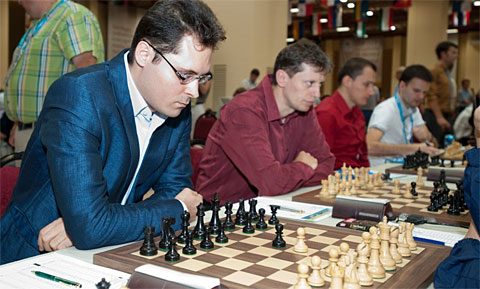
The Philippines, seeded only 35th in the starting list, bravely resisted the fourth seed Hungary (above with Peter Leko) to go home with a 2-2 tie.
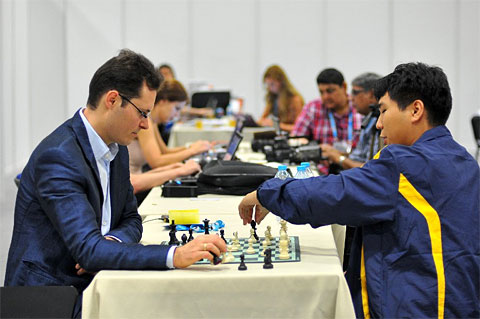
Peter Leko and Wesley So played a wild line of the Marshall Attack, but
the game ended in a draw.
Zoltan Almasi took his team into the lead with a win against Oliver Barbosa, but the legendary Eugenio Torre, first Asian Grandmaster and record holder with 21 appearances in the Olympiads, escaped from a passive position to pull off a victory against Ferenc Berkes and equalise the score.
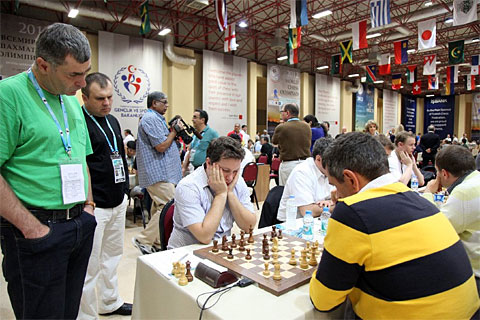
Germany edged Moldova 2.5-1-5 (above Akardij Naiditsch vs Viktor Bologan)
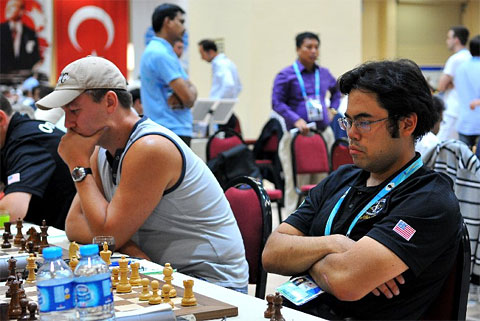
The USA (above with Gata Kamsky and Hikaru Nakamura) won against...
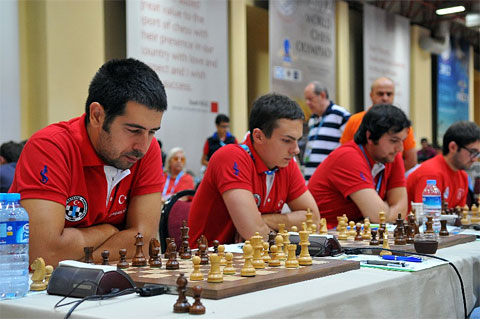
...the young Turkish team (above) by 3.5-0.5.
Argentina and India, as well as Israel and France, traded a couple of defeats for each team to split the points in their respective matches. England defeated Georgia 2.5-1-5, with Nigel Short scoring the sole victory on board three..
No. |
SNo |
Team | Res. |
Res. |
Team | SNo |
1 |
7 |
Azerbaijan | 1½ |
2½ |
Russia | 1 |
2 |
6 |
China | 2½ |
1½ |
Armenia | 3 |
3 |
35 |
Philippines | 2 |
2 |
Hungary | 4 |
4 |
2 |
Ukraine | 2½ |
1½ |
Spain | 18 |
5 |
23 |
Moldova | 1½ |
2½ |
Germany | 14 |
6 |
29 |
Argentina | 2 |
2 |
India | 13 |
7 |
5 |
USA | 3½ |
½ |
Turkey | 31 |
8 |
12 |
Israel | 2 |
2 |
France | 8 |
9 |
26 |
Georgia | 1½ |
2½ |
England | 11 |
10 |
38 |
Mexico | 1 |
3 |
Uzbekistan | 33 |
11 |
22 |
Italy | 1½ |
2½ |
FYROM | 49 |
12 |
19 |
Croatia | 2 |
2 |
Greece | 21 |
13 |
50 |
Bosnia Herz. | 2 |
2 |
Czech Republic | 17 |
14 |
57 |
Turkmenistan | 1½ |
2½ |
Latvia | 30 |
15 |
37 |
Egypt | 1 |
3 |
Serbia | 20 |
16 |
10 |
Bulgaria | 1½ |
2½ |
Netherlands | 9 |
17 |
16 |
Poland | 3 |
1 |
Montenegro | 44 |
18 |
27 |
Vietnam | 2 |
2 |
Turkey 2016 | 72 |
19 |
64 |
Portugal | 1 |
3 |
Romania | 25 |
20 |
28 |
Slovenia | 3½ |
½ |
Sweden | 34 |
The spectators of the Women's section witnessed the most exciting match since the beginning of the Olympiad. Russia and Poland were paired on the top table. All four games continued well into the fifth hour, and the defending champions were on the brink of defeat.
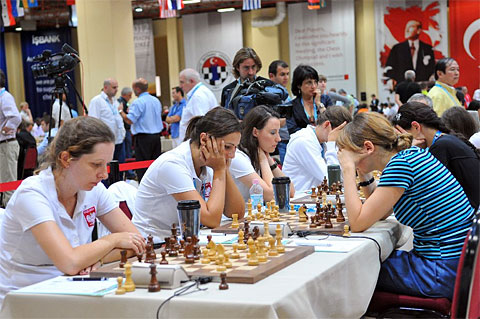
Nadezhda Kosintseva's king was running for its life, but Iweta Rajlich couldn't land the decisive punch and finish the game. The queens endgame was drawn. The position in Karina Szczepkowska-Natalija Pogonina was roughly equal, but after the second time control Karina suddenly panicked and gave up the exchange. The Russian women's champion duly converted the advantage. Around the same time Jolanta Zawadzka defeated Alexandra Kosteniuk to even the score. European champion Valentina Gunina and Monika Socko continued to play their rook endgame for about 50 moves, until it finally became obvious that black could not win. A gigantic battle that ended in a 2-2 tie.
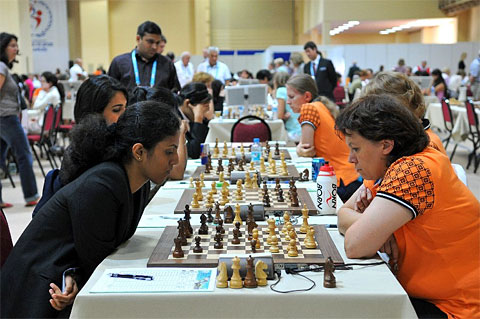
India beat Estonia by 3-1 (above GM Harika Dronavalli beating WIM Monika
Tsiganova)
China beat the eternal rivals from Georgia by 2.5-1.5, thanks to the victories on the lower two boards. Ukraine and France signed four draws, while the match Serbia-Vietnam was also tied, but only after the opponents exchanged a pair of victories for each team. Hungary somehow broke the resistance of the young team from Montenegro. Spain edged Greece and is now in the group of teams on the shared fourth place.
No. |
SNo |
Team | Res. |
Res. |
Team | SNo |
1 |
2 |
Russia | 2 |
2 |
Poland | 7 |
2 |
3 |
Georgia | 1½ |
2½ |
China | 1 |
3 |
4 |
Ukraine | 2 |
2 |
France | 14 |
4 |
19 |
Serbia | 2 |
2 |
Vietnam | 28 |
5 |
12 |
Hungary | 2½ |
1½ |
Montenegro | 42 |
6 |
11 |
Spain | 2½ |
1½ |
Greece | 18 |
7 |
49 |
Estonia | 1 |
3 |
India | 6 |
8 |
35 |
Uzbekistan | 2½ |
1½ |
Peru | 37 |
9 |
20 |
Slovakia | ½ |
3½ |
Iran | 26 |
10 |
5 |
USA | 4 |
0 |
Belgium | 48 |
11 |
22 |
Kazakhstan | 3 |
1 |
Mongolia | 21 |
12 |
39 |
Bosnia Herz. | ½ |
3½ |
Bulgaria | 13 |
13 |
16 |
Slovenia | 2 |
2 |
Azerbaijan | 27 |
14 |
31 |
Italy | 1½ |
2½ |
Armenia | 8 |
15 |
38 |
Switzerland | 3 |
1 |
Turkey | 45 |
16 |
17 |
Netherlands | 1½ |
2½ |
Lithuania | 33 |
17 |
23 |
Czech Rep. | 2½ |
1½ |
Indonesia | 54 |
18 |
46 |
Sweden | ½ |
3½ |
Romania | 10 |
19 |
57 |
Philippines | 3 |
1 |
Portugal | 52 |
20 |
74 |
Syria | 0 |
4 |
Germany | 9 |
|
|
Summaries from the official web site,
photos by David Llada, Arman Karakhanyan, Anastasiya Karlovich
This match-up needs little introduction. Armenia is a clear powerhouse, who is now even stronger by having added Movsesian to their line up. The Chinese are an extremely young and extremely solid team. Their chess is very 'correct' and you don't see them speculating too much. Armenia's experience made them favorites, but if favorites always won in chess, it just wouldn't be much fun.
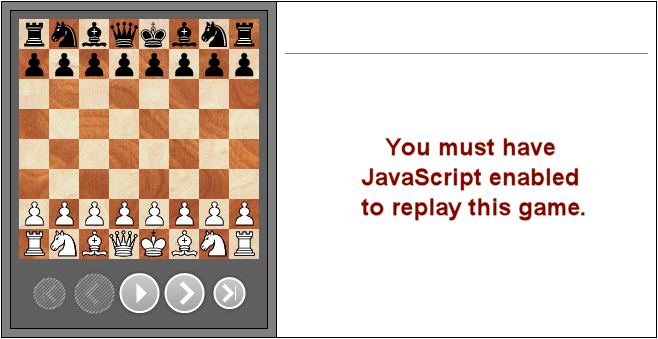
There is live commentary of the most interesting games on Playchess.com,
beginning around half an hour after the games have started.
| 4 September 2012 | 15.00 | 7th Round | Reeh/Müller |
| 5 September 2012 | 15.00 | 8th Round | Daniel King |
| 6 September 2012 | 15.00 | 9th Round | Valery Lilov |
| 7 September 2012 | 15.00 | 10th Round | Daniel King |
| 8 September 2012 | Free Day | ||
| 9 September 2011 | 11.00 | 11th Round, Closing | Daniel King |
| 10 September 2011 | Departure | ||
Some hours after the end of each round we will be posting video summaries by Daniel King on our news page. If possible they will appear on the same night, otherwise early the next morning. We also expect best-game video commentary from Andrew Martin.

Links
The top games are being broadcast live on the official web site and on the chess server Playchess.com. If you are not a member you can download a free Playchess client there and get immediate access. You can also use ChessBase 11 or any of our Fritz compatible chess programs. |